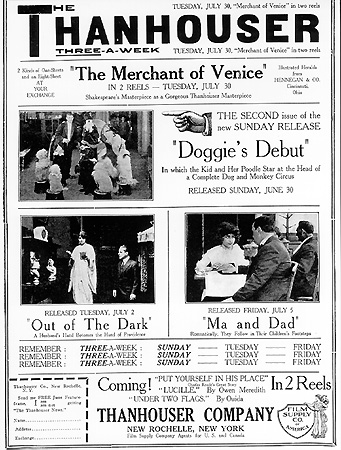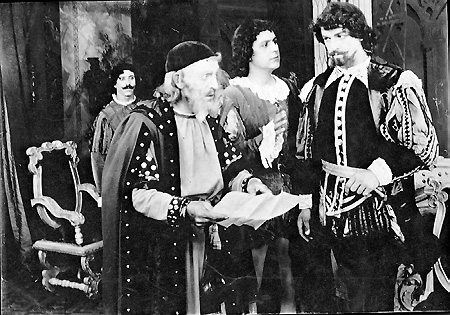 Volume II: Filmography
Volume II: Filmography Volume II: Filmography
Volume II: Filmography


Advertisement from The Moving Picture World, June 29, 1912. (F-480).
Production still with William J. Bowman in the role of Shylock. (F-500)
July 26, 1912 (Friday)
Length: 2 reels
Character: Drama
Director: Lucius J. Henderson
Scenario: From William Shakespeare's play of the same name
Cast: William J. Bowman (Shylock), Mignon Anderson (Jessica, his daughter), Florence LaBadie (Portia), Harry Benham (Bassanio), William Russell (Antonio), Ethyle Cooke (Nerissa?), William Garwood, Grace Nile, Mikhail Mitzoras
Notes: 1. This film was originally scheduled to be released on July 30, 1912. After the release date was changed to July 26, 1912, some trade notices continued to carry the July 30, 1912 date. 2. In a review in The Moving Picture World, Harry Benham's surname was erroneously given as "Burnham." 3. A scene from the film appears on the cover of the July 13, 1912 issue of The Moving Picture News. 4. This play was dramatized for the screen by Vitagraph in 1908 and Gold Seal in 1914. 5. In his column, "Music for the Picture," in the August 10, 1912 issue of The Moving Picture World, Clarence E. Sinn gave suggestions for musical accompaniment to the film, naming 14 melodies each for the first and second reels. 6. An expanded story by O.A. Miller, based on the plot of the film, appeared in The Photoplay Magazine, August 1912. 7. In his 1968 book, Shakespeare on Silent Film, Robert Hamilton Ball, who had met with Edwin Thanhouser during his research for the volume, suggested that an outdoor scene in an Italianate garden may have been filmed at the home of his friend, E.M. Benedict. 8. For biographical information concerning Shakespeare, refer to the Background of the Scenario entry under The Winter's Tale, released May 27, 1910.
SYNOPSIS, The Moving Picture World, July 20, 1912:
"PART ONE: Antonio, a nobleman and a merchant of Venice, was asked by his kinsman for a large sum of money. Bassanio wishes to travel afar, in order to woo Portia, a woman of great fortune, as well as one of wit and beauty. Bassanio has not the necessary funds to make the trip, and therefore comes to Antonio for aid. Antonio, although a man of wealth, finds that he has no gold, his fortune being represented in the cargoes aboard his various ships at sea. He knows that in a few weeks his ships will return and he will have ample funds, but in the meanwhile, he offers to borrow for his kinsman's present need of a notorious money lender of Venice, Shylock, the Jew. Shylock has long hated Antonio, and because of his proud spirit, when he consents to lend the money, it is only on condition that Antonio should sign a bond, whereby, should he fail to return the money inside of three months, the Jew shall receive, in lieu of interest, a pound of his, Antonio's, flesh, to be cut off by Shylock. Antonio laughingly agrees to this bond. He knows the Jew desires his death, but feels so sure that in much less than three months' time his ships will return, and he can easily pay the borrowed money. With the money obtained by his kinsman on this strange bond, Bassanio travels to the home of the fair Portia. There, after passing a test imposed upon her suitors by her father, Bassanio is finally accepted, and finds that he owes all his good fortune in winning the lady of his desire to his noble kinsman, Antonio.
"PART TWO: Bassanio is happily married to his lady love, Portia, when he receives a message of distress from his noble kinsman, Antonio, the merchant of Venice. Antonio writes that his many ships, containing all his wealth, have been lost at sea, and that he is not able to pay to Shylock, the money lender, the money he had borrowed for Bassanio. Because he is unable to pay, Shylock will be able to extract from Antonio a pound of his flesh. When Portia heard of the plight in which her husband's kinsman found himself, she dispatched Bassanio with many times the amount of gold Antonio owed him, in order the noble life might be saved. Shylock, however, refused to take the money, insisting that he be allowed to cut from near Antonio's heart the pound of flesh that had been pledged him. Thus he could kill his enemy. Had not Portia, disguised as a doctor of the law, succeeded in being present at the court, Antonio's life would surely have been forfeited. Portia, however, made it plain to all that in justice to Shylock, Antonio must allow him his pound of flesh. But she also warned Shylock that if, in taking the flesh, he took one drop of blood, he would be committing a crime, as no blood was nominated in the bond. Shylock, outwitted, failed to get his terrible revenge, and Bassanio, when he went to thank the learned lawyer who had saved his friend, found, to his great joy, that 'she' was none other than Portia, his own clever and beautiful wife."
REVIEW, The Bioscope, January 9, 1913:
"The Thanhouser Company's production of Shakespeare's comedy, The Merchant of Venice, is admirable in many respects, not only for what it has successfully attempted, but also for what, with great discretion and judgement, it has omitted. The enthusiastic student of any great dramatic writer's works is always inclined to be hypercritical in his attitude towards their public representation, and no doubt there were many learned bookworms in the palmy days of Garrick or Siddons who counted it almost a sacrilege to drag King Lear or Lady Macbeth from the dignified seclusion of the library into the glare of publicity, and so, many students of today will no doubt hold that Shakespeare, deprived of the splendours of his matchless verse, is hardly Shakespearean at all; as much of an anomaly as his own great tragedy of Hamlet played without the Prince of Denmark. It is certain that in most of his works the plot is the least of the matter, and rarely of his original invention, but in every case, and notably in The Merchant of Venice, the main story, published many years before he ever turned his thoughts to play-writing, is so embroidered and adorned by his inimitable fancy that the bare synopsis is sufficient to provide entertainment in overflowing measure.
"In adapting Shakespeare to the screen some producers have thought it sufficient to enlist the services of a distinguished star who has made a well-deserved reputation in some particular part, and condense the play within reasonable limits by the elimination of as many of the minor characters as can be spared from the support of the leading character. This method is not invariably attended with complete success, for an actor may have gained world-wide renown for his inspired performance of Romeo, or an actress may have charmed hemispheres as Portia, and still not retain the physical qualifications which are so essential to the wordless play; and with regard to the play, the street brawls between Capulet and Montague, or the belabouring of Falstaff, are of infinitely more value than Hamlet's soliloquies or the sage reflections of the melancholy Jacques.
"The Thanhouser Company has carefully steered clear of these errors, and out of the story of Antonio and Shylock an interesting play has been evolved, in which all the salient features of the original have been preserved. Bassanio's love story takes place in surroundings which convey a striking picture of Venetian luxury, and local colour is imparted by the employment of gondolas and the introduction of the very picturesque Italian seamen, who bring the news of Antonio's maritime reverses. The court-house and the villa at Belmont are buildings of imposing magnificence, and the scene of the carnival on the night of Jessica's elopement is full of spirit and life. The humour of Gratiano and of young Launcelot Gobbo is wisely sacrificed, but, by way of compensation, we are introduced to a new character in the person of the learned Bellarios, which provides an excellent scene, where Portia visits him to reap the benefit of his legal experience. The adaptor has been well advised in refraining from long quotations from the play in the sub-titles, which in most cases have been well condensed, though in one inscription from the casket a familiar misquotation is retained and some of the explanations are somewhat transatlantic in phrase. The piece is richly dressed, and, being acted with commendable earnestness, should be certain to obtain a large measure of popular approval."
REVIEW, Cinema News and Property Gazette, January 1, 1913. Excerpt:
"The version which the Thanhouser Company has given us is the finest it has ever fallen to our lot to witness, and we doubt if this company, masters as they are in the art of film production, can ever go one better than their present attempt."
REVIEW by Louis Reeves Harrison, The Moving Picture World, July 20, 1912: This review is reprinted in the narrative section of the present work.
# # #
Copyright © 1995 Q. David Bowers. All Rights Reserved.